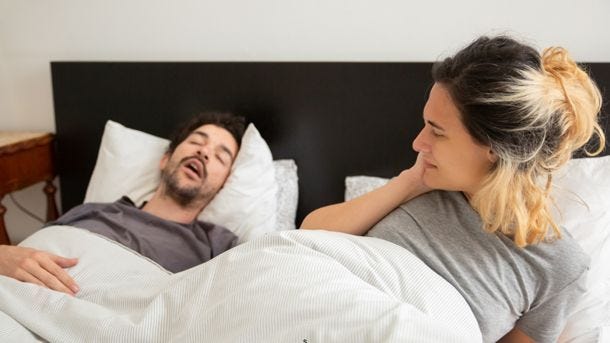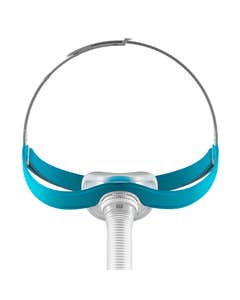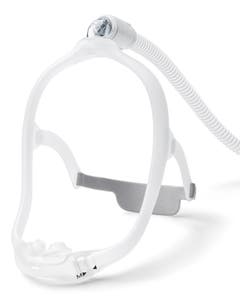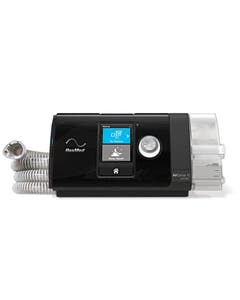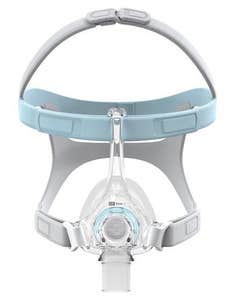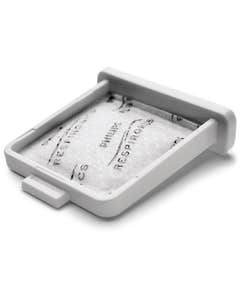Does A CPAP Machine Stop Snoring?
One of the side effects of sleep apnea can be snoring. While the main side effects – daytime tiredness and mental fogginess – affect only the patient, snoring can affect anyone else in the room where the person sleeps. If you want to know about CPAP and snoring and how to stop snoring, then read on.
Does CPAP Therapy Reduce or Eliminate Snoring?
It can do just that, in many cases, but since there are other causes for snoring, it is not fair to say that starting CPAP therapy will stop snoring. In a person with sleep apnea, the throat structures narrow and sometimes completely close during sleep creating a stoppage of air to the lungs. A CPAP machine uses continuous positive airway pressure to keep the throat more fully open throughout the night, preventing “apneic” events (breathing stoppages) that can usually reduce or eliminate snoring.
What is Snoring?
Snoring occurs when structures within the throat vibrate and cause noise. The sound can cover the range of noise levels, from quiet to incredibly loud. CPAP therapy can help with snoring, which may be a sign of obstructive sleep apnea (OSA). The parts of the throat that are most involved in snoring include the soft palate and the uvula.
Is Snoring Always a Symptom of Sleep Apnea?
While sleep apnea patients usually have snoring issues, many other people snore and do not have this condition. Here are some of the reasons a person might snore:
- The tongue dropping to the back of the mouth, which typically happens to people who sleep on the back.
- A jaw that is misshapen or mis-positioned. This can be caused by muscle tension.
- Nasal passageway obstructions.
- Excess tissue or fat in the area of the throat.
- Vibrations resulting from airway tissues touching.
- Throat weakness, causing the throat to close during sleep.
- Drugs or alcohol that have relaxed the muscles in the throat more than normal.
Snoring causes should be addressed to determine if sleep apnea is the primary cause and needs to be treated.
Is it Bad to Snore When You Sleep?
As many know, snoring can cause both the snorer and their bed partner to become sleep deprived, which can lead to irritable behavior, sleepiness during the day, lowered sex drive and thinking problems. Using a CPAP machine can often prevent these problems because it usually works to stop snoring. Researchers also claim that snoring can result in social and psychological damage to those suffering from it. Moreover, there are studies that point to a possible link between snoring and a risk of stroke that’s about 67 percent greater than in non-snorers, and a heart attack risk about 34 percent greater than in the rest of the population. Because many sleep apnea patients snore, CPAP therapy can also usually solve this snoring problem.
Does CPAP Therapy Stop Snoring?
A new study reported by the American Academy of Sleep Medicine (AASM) suggests that 29.4 million Americans have OSA, but only 20 percent of them have been formally diagnosed. Shockingly, that means 23.52 million Americans don’t realize they have OSA. They are all possibly snoring (and causing their bedroom partners to lose sleep as well) and certainly not as alert, productive or physically healthy as they could be.
Forty-five percent of normal adults snore occasionally and 25 percent snore every time they sleep. People most prone to habitual snoring are older and overweight. Children should never snore. In children, snoring may be a sign of problems with the tonsils and adenoids, and should be brought to a doctor’s attention.
In a recent poll of 430 CPAP users, we asked them whether their CPAP machines helped or worked to stop snoring. Almost 82% of them said that their snoring stopped with CPAP!
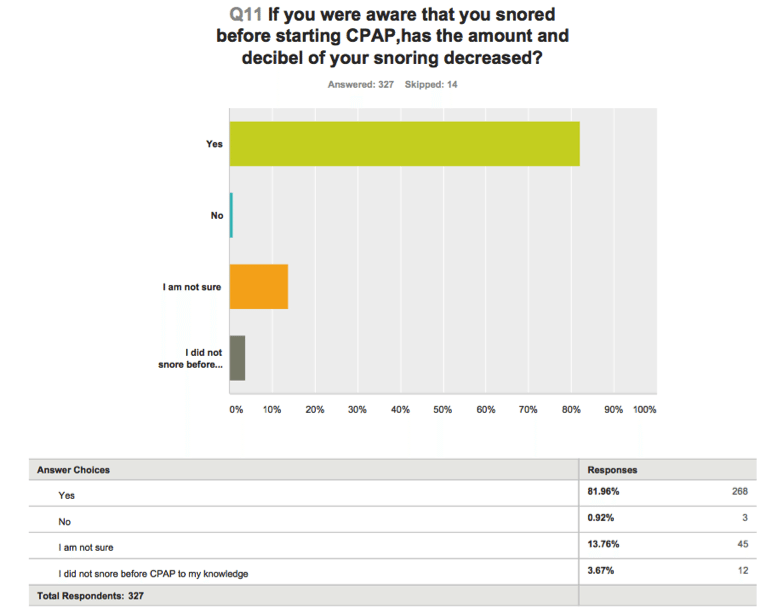
45 of our respondents (13.76%) were not sure whether their snoring decreased, and 3.6% (12 people) didn’t snore before they were given CPAP. Less than 1% (only 3 people) still snored after CPAP therapy! Obviously, CPAP still remains the most efficient and acceptable means to control snoring and OSA on the market today.
Snoring and Bed Partners
Of course, OSA sufferers aren’t the only ones impacted by the use of CPAP therapy. To confirm our suspicion, we asked the non-CPAP user about their experience. Interestingly, All but 1% (the CPAP users who still snore) have a better night’s sleep after their partners were put on CPAP. Maybe there are other sleep issues at play in these sleep partners related to their snoring, and that's also why we say that CPAP usually stops snoring.
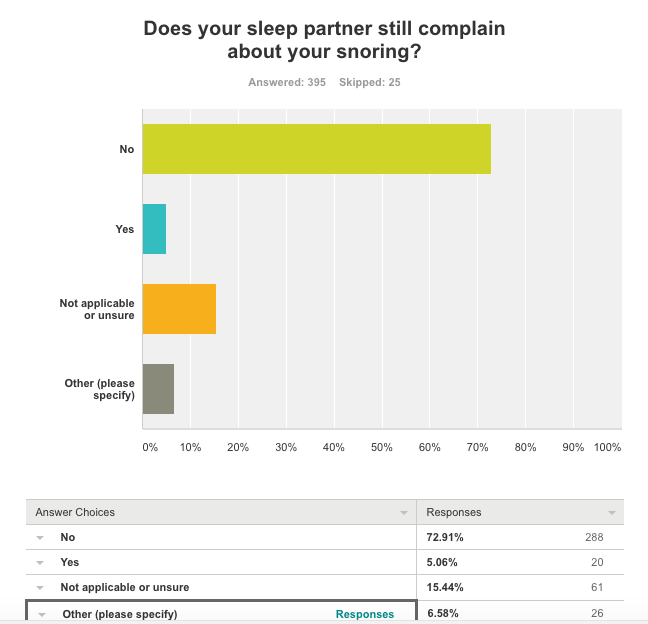
Snoring Is Serious
Not only is snoring an affliction, it can be a sign of OSA which can lead to many long-term health problems. It has been shown that OSA can be quite dangerous including linked to heart attack, stroke, diabetes, not to mention chronic fatigue,daytime drowsiness and drowsy driving. Snoring can also causes disruption of the natural sleep cycle, leaving snorers and their bed partners sleepy during the day.
A recent study conducted at Henry Ford Hospital in Detroit shows mounting evidence that people who snore are also much more likely to have thickening of their carotid artery, a condition called atherosclerosis. The thickening of these arteries can severely limit blood flow to the brain, weakening arterial walls and increasing the chances of an aneurysm or stroke.
Although there are a number of treatments that can alleviate mild snoring, sufferers should start by seeking medical diagnosis. A simple sleep study can easily determine if sleep apnea is present during sleep. Moreover, this will help determine if the case is mild or chronic, the possible causes as well as the most likely courses of treatment. Initial diagnosis will also help to show if further sleep studies are necessary to determine if the person is suffering from OSA. What about the person who does not have OSA but snores? What can be done to stop snoring then?
What can be done for snoring – for the Occasional Snorer?
If you or your bed partner snore only occasionally, there are things that can be tried to quiet the vibrations. They include:
- Loose weight and exercise the throat and tongue. We’ve written about the relationship between obesity, snoring and OSA in the past
- Avoid things that relax the throat like sleeping pills and antihistamines before bedtime.
- Don’t eat a heavy meal before bed
- Avoid alcohol for at least four hours before bed
- Sleep on your side rather than your back
- Elevate the head of your bed four inches.
Click on the image to zoom in.
While snoring is often a sign of sleep apnea, the two are not mutually exclusive. Many people who snore do not have sleep apnea; likewise, many people who have sleep apnea do not snore. It’s important to keep an eye out for less obvious signals as well.
This graphic provides a brief overview of what snoring can mean in different people in different stages of life, and when it becomes a reason for concern.
If you are concerned about sleep apnea, consult a qualified healthcare professional.
The CPAP Shop cares about the health of all people and focuses on providing the highest quality CPAP machines used in CPAP therapy to patients with sleep apnea and those whose doctors have recommended the therapy as a treatment for snoring. If we can answer any questions about our products, don’t hesitate to give us a call at (866) 414-9700, or contact us through our website.
Chris Vasta is the president of The CPAP Shop and an expert in sleep and respiratory therapy. He often provides insights on product design and functionality on various manufacturers’ prototypes and is frequently tapped to provide reviews on new releases.
One of the side effects of sleep apnea can be snoring. While the main side effects – daytime tiredness and mental fogginess – affect only the patient, snoring can affect anyone else in the room where the person sleeps. If you want to know about CPAP and snoring and how to stop snoring, then read on.
Does CPAP Therapy Reduce or Eliminate Snoring?
It can do just that, in many cases, but since there are other causes for snoring, it is not fair to say that starting CPAP therapy will stop snoring. In a person with sleep apnea, the throat structures narrow and sometimes completely close during sleep creating a stoppage of air to the lungs. A CPAP machine uses continuous positive airway pressure to keep the throat more fully open throughout the night, preventing “apneic” events (breathing stoppages) that can usually reduce or eliminate snoring.
What is Snoring?
Snoring occurs when structures within the throat vibrate and cause noise. The sound can cover a range of noise levels, from quiet to incredibly loud. CPAP therapy can help with snoring, which may be a sign of obstructive sleep apnea (OSA). The parts of the throat that are most involved in snoring include the soft palate and the uvula.


Is Snoring Always a Symptom of Sleep Apnea?
While sleep apnea patients usually have snoring issues, many other people snore and do not have this condition. Here are some of the reasons a person might snore:
- The tongue drops to the back of the mouth, which typically happens to people who sleep on the back.
- A jaw that is misshapen or mispositioned. This can be caused by muscle tension.
- Nasal passageway obstructions.
- Excess tissue or fat in the area of the throat.
- Vibrations resulting from airway tissues touching.
- Throat weakness, causing the throat to close during sleep.
- Drugs or alcohol have relaxed the muscles in the throat more than normal.
Snoring causes should be addressed to determine if sleep apnea is the primary cause and needs to be treated.
Is it Bad to Snore When You Sleep?
As many know, snoring can cause both the snorer and their bed partner to become sleep deprived, which can lead to irritable behavior, sleepiness during the day, lowered sex drive and thinking problems. Using a CPAP machine can often prevent these problems because it usually works to stop snoring. Researchers also claim that snoring can result in social and psychological damage to those suffering from it. Moreover, there are studies that point to a possible link between snoring and a risk of stroke that’s about 67 percent greater than in non-snorers, and a heart attack risk about 34 percent greater than in the rest of the population. Because many sleep apnea patients snore, CPAP therapy can also usually solve this snoring problem.
Does A CPAP Machine Help With Snoring?
A new study reported by the American Academy of Sleep Medicine (AASM) suggests that 29.4 million Americans have OSA, but only 20 percent of them have been formally diagnosed. Shockingly, that means 23.52 million Americans don’t realize they have OSA. They are all possibly snoring (and causing their bedroom partners to lose sleep as well) and certainly not as alert, productive or physically healthy as they could be.
Forty-five percent of normal adults snore occasionally and 25 percent snore every time they sleep. People most prone to habitual snoring are older and overweight. Children should never snore. In children, snoring may be a sign of problems with the tonsils and adenoids and should be brought to a doctor’s attention.
In a recent poll of 430 CPAP users, we asked them whether their CPAP machines helped or worked to stop snoring. Almost 82% of them said that their snoring stopped with CPAP!
45 of our respondents (13.76%) were not sure whether their snoring decreased, and 3.6% (12 people) didn’t snore before they were given CPAP. Less than 1% (only 3 people) still snored after CPAP therapy! Obviously, CPAP still remains the most efficient and acceptable means to control snoring and OSA on the market today.
If You’re Using a CPAP For Snoring, but Still Snoring - Here’s Why:
If you are still snoring while using a CPAP machine, it is recommended to consult with your healthcare provider as soon as possible. They may be able to adjust your pressure settings to better suit you. Another solution is to add a chinstrap while sleeping, as it will help to keep your mouth closed while you sleep, reducing the chance of snoring.
Snoring and Bed Partners
Of course, OSA sufferers aren’t the only ones impacted by the use of CPAP therapy. To confirm our suspicion, we asked the non-CPAP user about their experience. Interestingly, All but 1% (the CPAP users who still snore) have a better night’s sleep after their partners were put on CPAP. Maybe there are other sleep issues at play in these sleep partners related to their snoring, and that's also why we say that CPAP usually stops snoring.
Snoring is Serious
Not only is snoring an affliction, it can be a sign of OSA which can lead to many long-term health problems. It has been shown that OSA can be quite dangerous including linked to heart attack, stroke, diabetes, not to mention chronic fatigue,daytime drowsiness and drowsy driving. Snoring can also causes disruption of the natural sleep cycle, leaving snorers and their bed partners sleepy during the day.
A recent study conducted at Henry Ford Hospital in Detroit shows mounting evidence that people who snore are also much more likely to have thickening of their carotid artery, a condition called atherosclerosis. The thickening of these arteries can severely limit blood flow to the brain, weakening arterial walls and increasing the chances of an aneurysm or stroke.
Although there are a number of treatments that can alleviate mild snoring, sufferers should start by seeking medical diagnosis. A simple sleep study can easily determine if sleep apnea is present during sleep. Moreover, this will help determine if the case is mild or chronic, the possible causes as well as the most likely courses of treatment. Initial diagnosis will also help to show if further sleep studies are necessary to determine if the person is suffering from OSA. What about the person who does not have OSA but snores? What can be done to stop snoring then?
What Can Be Done for Snoring for the Occasional Snorer?
- Lose weight and exercise the throat and tongue. We’ve written about the relationship between obesity, snoring, and OSA in the past
- Avoid things that relax the throat like sleeping pills and antihistamines before bedtime.
- Don’t eat a heavy meal before bed
- Avoid alcohol for at least four hours before bed
- Sleep on your side rather than your back
- Elevate the head of your bed four inches
- Quit smoking
Change Your Sleeping Position
The position you sleep in certainly contributes to snoring. It is best to sleep on your side to keep the airway open, and it is not recommended to sleep on your back as that actually encourages snoring. Although it can be challenging to change to sleeping on their side, those who snore should try their best to adjust their normal way of sleeping to side sleeping to have a better chance of not snoring. They can also use certain products, like pillows, that promote side sleeping.
For those who can only sleep on their back, it is recommended to keep your head elevated. This can be done by using an adjustable bed or a larger pillow that will keep their upper body raised.
Medication
Those who take any sort of sleeping aid or muscle relaxer before falling asleep could have trouble with snoring. That's because the medication taken could affect a person's throat muscles, which could result in snoring. Talk to your healthcare provider before making any changes, but it may be beneficial to sleep without taking any type of medication to avoid snoring.
However, if the reason a person is snoring is that they are congested, taking medicine to clear their congestion could actually be beneficial while sleeping. Nasal strips or over-the-counter medications can help with nasal congestion. Nasal strips are placed on the outside of the nose and widen passageways to make breathing easier. It is also recommended to consult your physician or pharmacist before taking any type of medication.
Oral Appliances
Oral appliances can be used in the event nothing else is working for an individual. They hold a person's mouth and jaw in place and also prevent the tongue from blocking the throat, reducing the chance of a person snoring. An oral appliance can be worn in the mouth around the teeth, similar to a mouthguard or retainer.
Additionally, oral appliances are an alternative treatment to CPAP therapy and may better suit those who have trouble using a CPAP machine.
Conclusion
While snoring is often a sign of sleep apnea, the two are not mutually exclusive. Many people who snore do not have sleep apnea; likewise, many people who have sleep apnea do not snore. It’s important to keep an eye out for less obvious signals as well. If you are concerned about sleep apnea, consult a qualified healthcare professional.
The CPAP Shop cares about the health of all people and focuses on providing the highest quality CPAP machines used in CPAP therapy to patients with sleep apnea and those whose doctors have recommended the therapy as a treatment for snoring. If we can answer any questions about our products, don’t hesitate to give us a call at (866) 414-9700, or contact us through our website.



